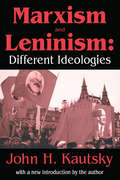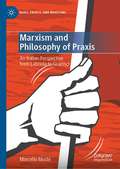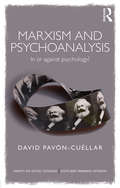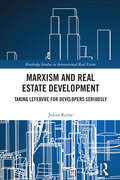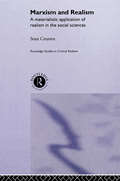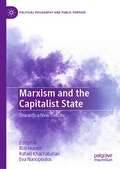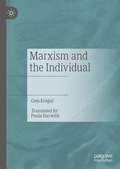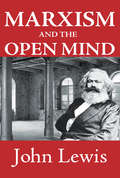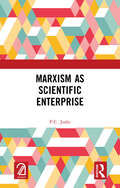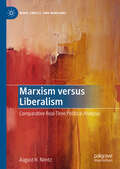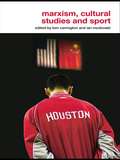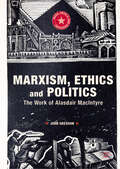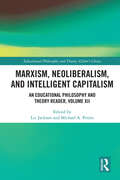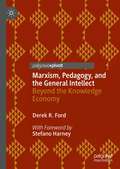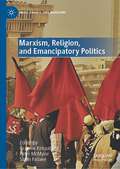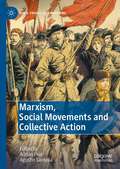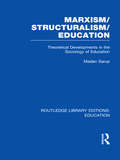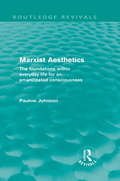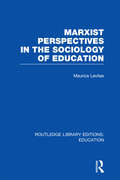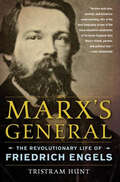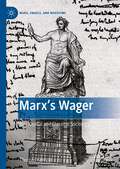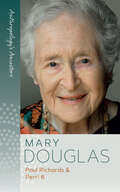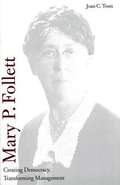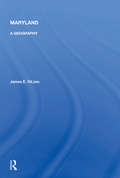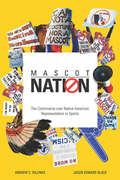- Table View
- List View
Marxism and Leninism: An Essay in the Sociology of Knowledge
by John H. KautskyOne of the pre-eminent scholars in the history and theory of European socialism, John Kautsky in this volume develops the argument that Marxism and Leninism are two quite different ideologies. He counterposes this view with the commonly accepted one of Leninism as simply one form that Marxism took in the course of its evolution. The easy identification of Marxism and Leninism with each other has been responsible for great confusion in the realm of both scholarly and political discourse.Kautsky develops his position within the tradition of the sociology of knowledge, by the close examination of the different meanings of the Marxist vocabulary as it was used by Marxists and Leninists. His frame of reference turns on the position of labor in turn-of-the-century industrial Europe and the role of modernizing intellectuals in underdeveloped countries. While the vocabulary used was often common to Marx and Lenin, Marxism was explicitly concerned with appeals to workers in industrial nations such as Germany and Austria, whereas Leninism appeals to revolutionaries in underdeveloped nations such as Russia and China.Whatever be the current assessment of the future of socialism and communism, Kautsky holds that it is important to study the core structure of both Marxism and Leninism, since they were major phenomena that powerfully affected the world in the twentieth century. Beyond that, in dealing with how different ideologies can be ensconced within the same rhetoric, the book offers an outstanding entrance into the sociology of knowledge as a tool for political analysis. This is a unique work in the function of language no less than the nature of ideology.The work is divided into five parts: Two environments, two ideologies, one terminology. The evolution of Marxism, its appeals in the German Empire. The evolution of Leninism, its appeals to strata involved in making modernizing revolutions. The differential outcomes of Marxism in the East and Leninism in the West. And finally, an examination of why Marxism and Leninism have been seen as a single ideology. In a new essay prepared for this new edition, Kautsky provides important autobiographical as well as historical reflections on how this book fits into the overall pattern of the author's work.
Marxism and Philosophy of Praxis: An Italian Perspective from Labriola to Gramsci (Marx, Engels, and Marxisms)
by Marcello MustèThis book will offer a full reconstruction of the history of Theoretical Marxism in Italy between 1895 and 1935, based on a rigorous philological method. The starting term (1895) is marked by the publication of Antonio Labriola's first essay on historical materialism (In memory of Communist Manifesto); the final term coincides with the conclusion of the "Prison Notebooks" written by Antonio Gramsci. This book analyses the original character of the Marxist philosophy in Italy, which emerged by distinguishing itself from the "orthodoxy" of the Second and Third International. By delineating a significant chapter in the history of Marxism, the book will also propose a specific contribution to the history of Italian Philosophy, which is here studied in relation to the developments of European philosophy, beyond the traditional subdivisions of Positivism, Idealism and Marxism.
Marxism and Psychoanalysis: In or Against Psychology? (Concepts for Critical Psychology)
by David Pavon-CuellarThe methods developed by Freud and Marx have enabled a range of scholars to critically reflect upon the ideological underpinnings of modern and now postmodern or hypermodern western societies. In this intriguing book, the discipline of psychology itself is screened through the twin dynamics of Marxism and psychoanalysis. David Pavón-Cuéllar asks to what extent the terms, concerns and goals of psychology reflect, in fact, the dominant bourgeois ideology that has allowed it to flourish. The book charts a gradual psychologization within society and culture dating from the nineteenth century, and examines how the tacit ideals within mainstream psychology – creating good citizens or productive workers – sit uneasily against Marx and Freud’s ambitions of revealing fault-lines and contradictions within individualist and consumer-oriented structures. The positivist aspiration of psychology to become a natural science has been the source of extensive debate, critical voices asserting the social and cultural contexts through which the human mind and behaviour should be understood. This challenging new book provides another voice that, in addressing two of the most influential intellectual traditions of the past 150 years, widens the debate still further to examine the foundations of psychology.
Marxism and Real Estate Development: Taking Lefebvre for Developers Seriously (Routledge Studies in International Real Estate)
by Julian RocheThis book straddles two worlds and attempts to bring them together: that of Lefebvre's Marxism on the one hand, and that of real estate development on the other. Lefebvre has now become a household name amongst many contemporary Marxists, especially those with an interest in urban planning and certain quarters of the architectural profession, however his work is far less well known by real estate professionals, whether investors, developers, brokers, or, indeed, policymakers. Marxism and Real Estate: Taking Lefebvre Seriously has both a large scope and a very bold aim – to use an explication and analysis of the work of Henri Lefebvre not only to present a critique of development, but, also to draw these two worlds together. It therefore, first, aims to present the arguments of this increasingly well-known French Marxist philosopher, sociologist, and pioneer of urban studies; second, to situate contemporary real estate development in the light of Lefebvre's work; and third, to analyse the potential application of Lefebvre’s work to each of the major components of contemporary real estate, to use Lefebvre's work in order to recommend practical action for developers, working alongside planners and architects, to influence the future of global real estate. As well as its direction at developers themselves, this book should be of interest to economists, real estate researchers and professionals, planners, urban studies scholars and, of course, to those interested in the application of Lefebvre's work to real estate.
Marxism and Realism: A Materialistic Application of Realism in the Social Sciences (Routledge Studies in Critical Realism #Vol. 1)
by Sean CreavenThis book rethinks Marx's sociology as a form of realist social theory, extending Roy Bhaskar's philosophical realism into the social sciences. By constructing historical materialism as realist social theory, it becomes possible to resolve many long standing dilemmas in Marxist discourse, such as voluntarism versus determinism and humanism versus economism.
Marxism and the Capitalist State: Towards a New Debate (Political Philosophy and Public Purpose)
by Rob Hunter Eva Nanopoulos Rafael KhachaturianThis book builds on the recent revival of interest in Marx and Marxism, calling for a renewal and refinement of Marxist state theory. It aims to provoke and encourage new debates and critiques that build on—but also update and extend—the rich tradition of Marxist analyses of the capitalist state, including the well-known debates of the 1970s. The chapters present a dynamic and diverse constellation of arguments and perspectives on a range of topics, from general re-appraisals of the capitalist state to investigations of contemporary challenges—including digitalisation, the ecological crisis, the coronavirus pandemic, social reproduction, and critical political economy. What they share is a commitment to an understanding of the specifically capitalist character of the modern state and its significance for any serious discussion of the causes of our current age of global catastrophe and the overcoming of capitalist social relations.
Marxism and the Individual
by Cem EroğulThis book attempts to develop a Marxist theory of the human individual. It contends that the standard description of the human as a bio-psycho-social being is fundamentally deficient as it doesn’t specify which of these attributes is the determining one. As long as this is not done, the real nature of humanity cannot be uncovered.
Marxism and the Open Mind (Routledge Library Editions: Marxism Ser.)
by John LewisIn Marxism and the Open Mind, John Lewis seeks to explain Marxism as a system of thought. In doing so, he addresses the studied neglect or grotesque misrepresentation that he feels characterizes Western attitudes toward Marxism. Lewis also aims to stimulate what he believes to be a long overdue re-evaluation of Marxism in the light of what was contemporary thought in 1957, the year of the book's original publication and the height of the Cold War era.The essays include chapters on human rights and a discussion on Marxism and liberty. Marxist ethics, a much-neglected theme, is the subject of an essay that deals with some of the most deeply felt criticisms of Marxism in the 1950s. The ethical aspects of Marxism are examined once again in a contribution to the debate on Marxism and religion. The volume concludes with essays on Berdyaev and Sartre, which strike a note on the Marxist estimation of these thinkers, and with an essay on Marxist humanism.The essays cover a wide field of thought, uniting a close and sympathetic study of Marxism with a critical judgment rooted in academic training at three universities and experience in the Christian ministry.
Marxism as Scientific Enterprise
by P.C. JoshiIn this colletion of essays the eminent social scientist, Dr. P.C. Joshi, argues that Marxism needs to be extended beyond the traditional confines set by Lenin and Mao in order to remain relevant in societies in which individuals have freedom of political expression and which are witnessing gigantic strides in communication technology. In democratic societies with a vibrant media, the Lenin-Mao inspired templates of conspiracy and peoples' war carry far less traction than in autocracies where communism has been successful. Dr. Joshi argues that democracy is ingrained in the spirit and legacy of Marx and the two can be true partners in social development. This requires tapping into classes and strata not considered by mainstream Marxists such as intermediate classes, intellectuals and bureaucrats, and harnessing the liberating potential offered by advances in technology.
Marxism versus Liberalism: Comparative Real-Time Political Analysis (Marx, Engels, and Marxisms)
by August H. Nimtz“An extraordinary work of political historical analysis that methodically and convincingly argues for the superiority of a Marxist approach for pursuing democracy. Rich in historical detail and thoroughly engrossing in portraying the real-time analyses of and intervention in crucial events by prominent Marxist and liberal theorists and political actors, Marxism versus Liberalism is a truly impressive achievement that will have an enduring appeal.” —John F. Sitton, Professor Emeritus, Political Science, Indiana University of Pennsylvania, USAPerforming a comparative real-time political analysis, Marxism versus Liberalism presents convincing evidence to sustain two similarly audacious claims: firstly, that Karl Marx and Frederick Engels collectively had better democratic credentials than Alexis de Tocqueville and John Stuart Mill; and secondly, that Vladimir Lenin had better democratic credentials than Max Weber and Woodrow Wilson. When the two sets of protagonists are compared and contrasted in how they read and responded to big political events in motion, this book contends that these Marxists proved to be better democrats than the history’s most prominent Liberals. Exploring the historical scenarios of The European Spring of 1848, the United States Civil War, the 1905 Russian Revolution, the 1917 Russian Revolution, and the end of World War I, Marxism versus Liberalism carefully tests each claim in order to challenge assumed political wisdom.
Marxism, Cultural Studies and Sport (Routledge Critical Studies in Sport)
by Ben Carrington Ian McDonaldThe cultural ubiquity, political prominence and economic significance of contemporary sport present fertile terrain for its critical socio-cultural analysis. From corporate and media dominated mega-events like the Olympic Games, to state programmes for nation-building and health promotion, to the cultural politics of "race", gender, sexuality, age and disability, sport is so profoundly marked by relations of power that it lends itself to critique and deconstruction. Marxism, Cultural Studies and Sport brings together leading experts on sport to address these issues and to reflect on the continued appeal of sport to people across the globe, as well as on the forms of inequality that sport both produces and highlights. Including a Foreword by Harry Cleaver and Afterword by Michael Bérubé, this book assesses the impact of this work on the fields of ‘mainstream’ Marxism and cultural studies. Marxism, Cultural Studies and Sport is centred on three vital questions: Is Marxism still relevant for understanding sport in the twenty-first century? Has Marxism been preserved or transcended by cultural studies? What is the relationship between theory and intervention in the politics of sport? The result is a unique and diverse examination of modern sports culture. The first book published on the relationship between sport and Marxism for over twenty years, Marxism, Cultural Studies and Sport is an invaluable resource for students of sport sociology, Marxism, and cultural studies at all levels.
Marxism, Ethics and Politics: The Work Of Alasdair Macintyre (Marx, Engels, And Marxisms Series)
by John GregsonThis book discusses Alasdair MacIntyre’s engagement with Marxism from the early 1950s to the present. It begins with his early writings on Marxism and Christianity, moving through his period in the New Left and the Socialist Labour League and International Socialism in the late 1950s and 1960s. It then discusses MacIntyre’s break with Marxism by developing the brief but telling five-point critique he gives of Marxism in his 1981 volume After Virtue. Marxism, Ethics and Politics highlights MacIntyre’s continuing admiration for much in Marx’s thought, noting that his contemporary project is developed in response to what he now sees as the inadequacies of Marxism, particularly Marxist politics. It concludes by examining the place of Marxism in the contemporary MacIntyrean debate and by pointing out the contested nature of the claims about Marxism that MacIntyre makes.
Marxism, Neoliberalism, and Intelligent Capitalism: An Educational Philosophy and Theory Reader, Volume XII (Educational Philosophy and Theory: Editor’s Choice)
by Michael A. Peters Liz JacksonThis book explores Marxism and related political-economic theory, and its implications for education around the world, as seen in the history of the journal Educational Philosophy and Theory. As such, it illustrates the evolution of political-economic changes across societies, as they have been brought to bear within the academic field and in the journal, through the exploration of typical and noteworthy articles examining political-economic themes over time. In the early decades of Educational Philosophy and Theory, only a few works can be found focused on Marx’s work, Marxism, and related themes. However, since the mid-1990s, Educational Philosophy and Theory has published many articles focused on neoliberalism and educational responses to theories and policies based on political-economic perspectives. This collection serves to showcase this work, exploring the way Marxist, neoliberal and other related political-economic theories have been applied to educational discussions among philosophers and theorists of education in the history of Educational Philosophy and Theory. As a collection, this book provides a glimpse of a dramatically changing world, and changing scholarly responses to it, during the late nineteenth and early twentieth centuries. This collection can therefore be useful to scholars interested in better understanding how changes to the political economy have intersected with those in education over time, as well as the diverse ways scholars have approached and reacted to a shifting landscape, considering views ranging from Marxist to Post-Marxist, to neoliberal, and beyond.
Marxism, Pedagogy, and the General Intellect: Beyond the Knowledge Economy
by Derek R. FordThis book is the first to articulate and challenge the consensus on the right and left that knowledge is the key to any problem, demonstrating how the left’s embrace of knowledge productivity keeps it trapped within capital’s circuits. As the knowledge economy has forced questions of education to the forefront, the book engages pedagogy as an underlying yet neglected motor of capitalism and its forms of oppression. Most importantly, it assembles new pedagogical resources for responding to the range of injustices that permeate our world. Building on yet critiquing the Marxist notion of the general intellect, Derek R. Ford theorizes stupidity as a necessary alternative pedagogical logic, an anti-value that is infinitely mute and unproductive.
Marxism, Religion, and Emancipatory Politics (Marx, Engels, and Marxisms)
by Graeme Kirkpatrick Simin Fadaee Peter McMylorThis edited collection evaluates the relationship between Marxism and religion in two ways: Marxism’s treatment of religion and the religious aspects of Marxism. Its aim is to complicate the superficial understanding of Marxism as a simple rejection of religion both in theory and practice. Divided into two parts (Theory and Praxis), this book brings together the three different themes of Marxism, religion, and emancipation for the first time. The first part explores the more theoretical discussions regarding the relationship between Marxism and various themes (or currents) within religious thought, to highlight points of compatibility as well as incompatibilities/conflicts. The studies in the second part of the collection refer to how Marxist ideas are received in different parts of the world. They show that as soon as Marxism arrives in a new place, the theory interacts and bonds with a pre-existing stock of ideas, each changing the other reciprocally.
Marxism, Social Movements and Collective Action (Marx, Engels, and Marxisms)
by Adrián Piva Agustín SantellaThis book makes a relevant contribution to a Marxist critical explanation of social conflicts, social movements and protests. There is abundant literature on social conflict and social movements from Marxist perspectives. However, rigorous criticism, both theoretical and methodological, is scarce. The objective of this volume is the collection of works developing a critical reflection on the categories of theories about contentious collective action and social movements from a Marxist perspective. In order to better understand these phenomena and go beyond their mere case description, the theory needs to be improved. To that end, the book also promotes the debate between Marxisms and the collective action and new social movements in a renewed way. Here different Marxist arguments consider not only their methodological and ideological bias, but also the specific conceptual contributions of those theories.
Marxism/Structuralism/Education: Theoretical Developments in the Sociology of Education (Routledge Library Editions: Education)
by Madan SarupThis interdisciplinary textbook provides an introduction to the many theoretical developments and controversies which took place in the sociology and politics of education during the 1970s and 80s. The book Discusses the arguments concerning humanist and structuralist Marixsm. Provides a clear and concise introduction to structuralism and post-structuralism (work of Derrida, Lacan and Foucault) and theorises in the ways they contribute to Marxism or are subversive of it. Relates these theoretical perspectives to education and the practice of teachers.
Marxist Aesthetics: The foundations within everyday life for an emancipated consciousness (Routledge Revivals)
by Pauline JohnsonOriginally published in 1984, this study deals with a number of influential figures in the European tradition of Marxist theories of aesthetics, ranging from Lukacs to Benjamin, through the Frankfurt School, to Brecht and the Althusserians. Pauline Johnson shows that, despite the great diversity in these theories about art, they all formulate a common problem, and she argues that an adequate response to this problem must be based on account of the practical foundations within the recipient's own experience for a changed consciousness.
Marxist Perspectives in the Sociology of Education (Routledge Library Editions: Education)
by Maurice LevitasThe major theories explored are those concerned with social mobility and those which derive from a relativist position in Sociology, both of which see education as a selection mechanism for a stratified society. Social class, family, sociolinguistics and schools are among the topics discussed. In this analysis the author: defines key areas in the sociology of education gives access to important concepts of Marx and Engels strengthens sociological starting points by adding a Marxist element discriminates between radically different directions in education maps the main features of long-term working class goals This thoroughgoing Marxist critique of widely prevalent notions in the sociology of education provides a compass by which place and direction in this area of education may be found by students, teachers and parents.
Marx’s General: The Revolutionary Life of Friedrich Engels
by Tristram HuntFriedrich Engels is one of the most intriguing and contradictory figures of the nineteenth century. Born to a prosperous mercantile family, he spent his life enjoying the comfortable existence of a Victorian gentleman; yet he was at the same time the co-author of The Communist Manifesto, a ruthless political tactician, and the man who sacrificed his best years so that Karl Marx could have the freedom to write. Although his contributions are frequently overlooked, Engels's grasp of global capital provided an indispensable foundation for communist doctrine, and his account of the Industrial Revolution, The Condition of the Working Class in England, remains one of the most haunting and brutal indictments of capitalism's human cost. <p><p>Drawing on a wealth of letters and archives, acclaimed historian Tristram Hunt plumbs Engels's intellectual legacy and shows us how one of the great bon viveurs of Victorian Britain reconciled his exuberant personal life with his radical political philosophy. This epic story of devoted friendship, class compromise, ideological struggle, and family betrayal at last brings Engels out from the shadow of his famous friend and collaborator.
Marx’s Wager: Das Kapital and Classical Sociology (Marx, Engels, and Marxisms)
by Thomas KempleMarx's masterpiece Capital (Das Kapital) ignored or misread as well as selectively and creatively interpreted by the generation of social scientists that came after him. Emile Durkheim, Max Weber, and Georg Simmel attempt to supplement what they call ‘historical materialism’ or to engage in debates about ‘socialism’ through their readings of The Communist Manifesto and occasional Capital. Although these and other classical sociologists did not have access to most of Marx’s published and unpublished works as we do today, each is concerned with revising and refining Marx’s unfinished critique of political economy. Despite their differences with Marx and with one another, they share his concern with how empirically detailed and scientifically valid knowledge of the social world may inform historical struggles for a more human world. This commitment can be called ‘Faustian’, after the title character of the poet J. W. von Goethe’s tragic epic of modernity, insofar as Marx and the classical sociologists hope to translate theory into practice while making a pact or wager with the diabolical social, political, and economic forces of the modern world.
Mary Douglas (Anthropology's Ancestors #4)
by Perri 6 Paul RichardsThis handy, concise book covers the life of Mary Douglas, one of the most important anthropologists of the second half of the 20th century. Her work focused on how human groups classify one another, and how they resolve the anomalies that then arise. Classification, she argued, emerges from practices of social life, and is a factor in all deep and intractable human disputes. This biography offers an introduction to how her distinctive approach developed across a long and productive career and how it applies to current pressing issues of social conflict and planetary survival. From the Preface: The influence of Professor Dame Mary Douglas (1921-2007) upon each of the social sciences and many of the disciplines in the humanities is vast. The list of her works is also vast, and this presents a problem of choice for the many readers who want to get a general idea of what she wrote and its significance, but who are somewhat baffled about where to begin. Our book offers a short overview and suggests why her key writings remain significant today.
Mary P. Follett: Creating Democracy, Transforming Management
by Joan C. TonnMary P. Follett (1868-1933) brought new dimensions to the theory and practice of management and was one of America's preeminent thinkers about democracy and social organization. The ideas Follett developed in the early twentieth century continue even today to challenge thinking about business and civic concerns. This book, the first biography of Follett, illuminates the life of this intriguing woman and reveals how she devised her farsighted theories about the organization of human relations. --BOOK JACKET. Title Summary field provided by Blackwell North America, Inc. All Rights Reserved
Maryland: A Geography
by James E. DiLisioAlthough one of the smallest of the fifty states, in many ways Maryland is the United States in miniature, bringing together and exemplifying the diverse elements of the country. In it the North and the South meet, and Maryland is one of the original gateways to the West. Maryland is a study in contrasts, combining the poverty of the Appalachian hill people, the sharecroppers of the South, and the inner-city dwellers of Baltimore with the affluence of country manor estates and fashionable suburbs. Some of America's most rural scenes are interspersed there with some of its largest metropolitan centers. Added to this is a great physical diversity—the Coastal Plain, the Piedmont, the Delmarva Peninsula, the Chesapeake Bay, and the Appalachian Highlands. This book provides an analytical survey of the physical, social, cultural, and economic geography of Maryland. Though the emphasis is on human geography, significant attention is given to the physical base on which the cultural landscape has developed. Environmental issues, such as Chesapeake Bay pollution, coal mining in Western Maryland, and the urbanization of the beaches, are addressed to show how development has often led to conflicts between people and their environments.
Mascot Nation: The Controversy over Native American Representations in Sports
by Jason Edward Black Andrew C. BillingsThe issue of Native American mascots in sports raises passions but also a raft of often-unasked questions. Which voices get a hearing in an argument? What meanings do we ascribe to mascots? Who do these Indians and warriors really represent? Andrew C. Billings and Jason Edward Black go beyond the media bluster to reassess the mascot controversy. Their multi-dimensional study delves into the textual, visual, and ritualistic and performative aspects of sports mascots. Their original research, meanwhile, surveys sports fans themselves on their thoughts when a specific mascot faces censure. The result is a book that merges critical-cultural analysis with qualitative data to offer an innovative approach to understanding the camps and fault lines on each side of the issue, the stakes in mascot debates, whether common ground can exist and, if so, how we might find it.
